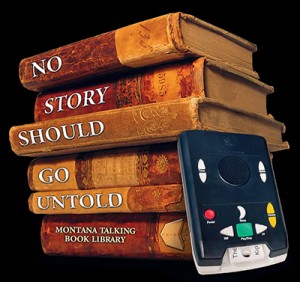BARD Policy
Montana State Library Commission
Montana Talking Book Library – BARD Policy
Background
NLS and its network of cooperating libraries have a long history of serving eligible readers through institutionally maintained deposit collections. (See NLM entries 5.6 and 5.11.) The policies relating to institutions for physical talking-book and braille service will also apply to institutional accounts on the Braille and Audio Reading Download (BARD).
BARD
The Braille and Audio Reading Download (BARD) is a password-protected website that enables eligible readers, upon approval by Montana Talking Book Library (MTBL), to download any of the thousands of titles recorded by NLS for its readership. Once Web-Braille has been merged with BARD, braille books and magazines will also be available from the site.
To maintain intellectual property protection, NLS and MTBL ensures that only eligible readers can receive NLS and Montana locally produced materials. The U.S. copyright law Chafee Amendment (P.L. 104-107 1.c) permits recording and brailling of books and magazines, without prior permission, to create special-format materials exclusively for blind and physically handicapped residents ofthe United States. In addition, the United States Postal Service Free Matter mailing privilege requires that the dispatched materials be in a special format and that recipients meet the NLS eligibility requirements.
In the digital environment, the NLS and MTBL commitment to protecting intellectual property has been taken one step futher. NLS books are produced on flash-memory cartridges, proprietary to NLS, and each book has a software key that enables it to be played only on an NLS or NLS-authorized commercial player.
Institutions already using talking-book services
Institutional accounts for BARD will be available to agencies that already receive MTBL service. These agencies may continue to borrow audiobooks (on cassette or digital cartridge) and playback equipment, and may also apply to download books or magazines from BARD.
The quantity of equipment loaned to an institution is at the discretion of MTBL. However, at no time will MTBL loan equipment to an institution on a one-for-one basis (i.e., one player for each client of the institution). If every eligible client of an institution needs a personal player, they are to be signed up individually for MTBL service.
Institutions that have not used talking-book services in the past
Upon receipt of a properly certified institutional application, MTBL will send appropriate books and playback equipment or, if the application is for BARD only, a notification that the institution may apply online for BARD service. A designated staff member at the institution oversees the downloading, tracks the use of NLS equipment, and handles any necessary returns to MTBL. An institution may borrow digital players from MTBL, when available, or purchase commercial players authorized to play NLS books.
Policy
The following criteria will be applied to Montana institutional deposit collections applying for BARD service:
- Any Montana institution currently receiving braille or cassette books from MTBL may request physical copies of books in digital format. Subject to availability of collections and playback equipment, MTBL may lend digital-audiobook cartridges and playback equipment to an existing deposit collection or to a new institutional applicant. The process will be the same as it is for cassettes. MTBL will use discretion regarding the number of digital players lent to any particular institution or school, although the rule of thumb is one player for every four readers.
- For the purpose of BARD access, NLS has identified three categories. The online BARD Institution Application can be accessed through this link:https://nlsbard.loc.gov/MT1AApplicationInstructions.html.Montana and other regional libraries may grant BARD access to institutions in these categories.
- Category A - BARD access may be granted to Montana schools for the blind. Access may also be granted to Montana public or private schools and college or university disability centers, provided that they submit a list of the names of eligible students who will use the service. The school or center should also submit properly certified applications for students who are not already registered users of the NLS/MTBL program. The students need not be set up to receive individual service, but the applications should be retained by MTBL to verify eligibility. MTBL requires public and private schools to submit a new eligible-student list at the beginning of each school year and certified individual applications as appropriate.
- Category B - BARD access may be granted to an employee of a Montana rehabilitation agency, a center for the blind, or a Lighthouse for the Blind organization who is applying for service to be able to demonstrate to eligible Montana readers how to download books from BARD. This employee does not have to be an eligible reader. MTBL may approve this type of application as long as applicants accept the BARD website pledge and understand that they will be held accountable for how the materials they download are used.
- Category C - BARD demonstration access may be granted to Montana public libraries. Public libraries must establish an institution account with MTBL prior to applying for a BARD account. Each public library may designate an employee to demonstrate BARD services to MTBL eligible residents. To apply for a BARD account, the public library's designee shall use the MTBL's online "BARD application for institutions link", utilizing their public library professional email address. Public libraries may then use their approved MTBL BARD institution account to demonstrate how to download digital books or magazines for eligible Montana residents registered with MTBL.
No Story Should Go Untold

Sometimes the best words on the page aren't on the page. That's why Montana Talking Books offers high quality audio books and magazines recorded by trained narrators for your reading pleasure. Because No Story Should Go Untold.
